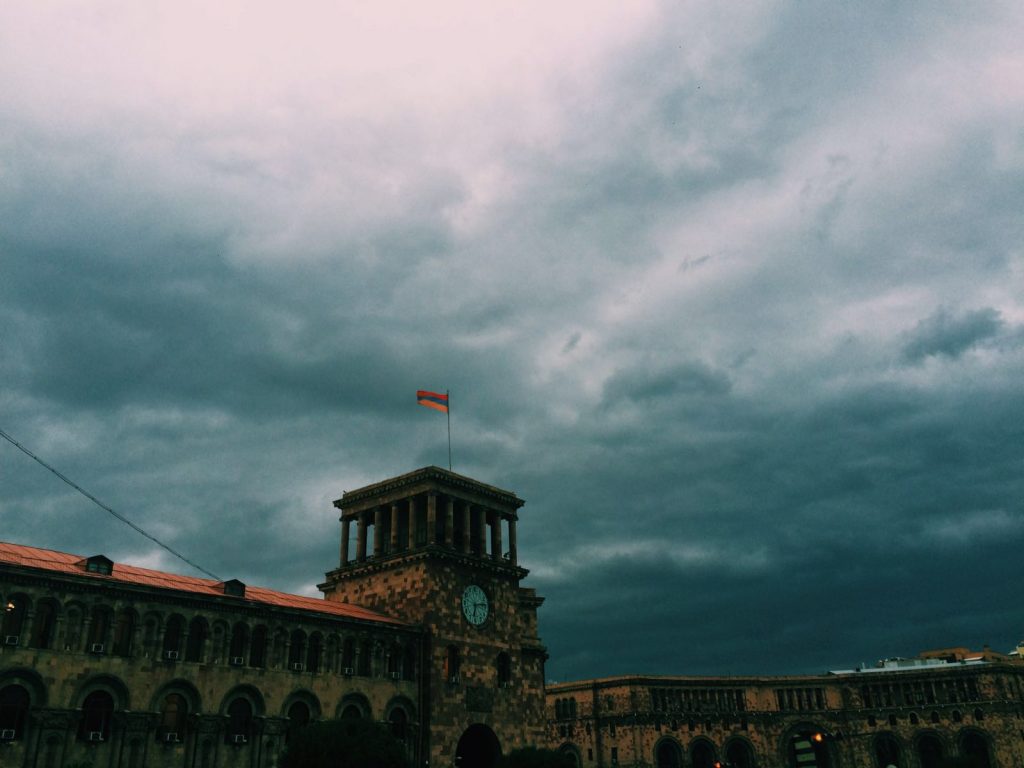
The Government Building in Yerevan (Photo: Araz Chiloyan)
Liberty
By Mikael Nalbandian
Translated by Alice Stone Blackwell
When God, who is forever free,
Breathed life into my earthly frame,—
From that first day, by His free will
When I a living soul became,—
A babe upon my mother’s breast,
Ere power of speech was given to me,
Even then I stretched my feeble arms
Forth to embrace thee, Liberty!
Wrapped round with many swaddling bands,
All night I did not cease to weep,
And in the cradle, restless still,
My cries disturbed my mother’s sleep.
“O mother!” in my heart I prayed,
“Unbind my arms and leave me free!”
And even from that hour I vowed
To love thee ever, Liberty!
When first my faltering tongue was freed,
And when my parents’ hearts were stirred
With thrilling joy, to hear their son
Pronounce his first clear-spoken word,
“Papa, Mamma,” as children use,
Were not the names first said by me;
The first word on ray childish lips
Was thy great name, O Liberty!
“Liberty!” answered from on high
The sovereign voice of Destiny:
“Wilt thou enroll thyself henceforth
A soldier true of Liberty?
The path is thorny all the way,
And many trials wait for thee;
Too strait and narrow is this world
For him who loveth Liberty.”
“Freedom!” I answered, “on my head
Let fire descend and thunder burst;
Let foes against my life conspire,
Let all who hate thee do their worst:
I will be true to thee till death;
Yea, even upon the gallows tree
The last breath of a death of shame
Shall shout thy name, O Liberty!”
***
Mikael Nalbandian (1829-1866) was an Armenian writer and a major figure in 19th-century Armenian literature. The lyrics of “Mer Hayrenik,” Armenia’s national anthem, are based on one of his poems.
Born in New Nakhichevan (currently Rostov-on-Don) in a family of a handicraftsman, and largely self-educated, Nalbandian initially pursued priesthood but left it soon after. He studied medicine briefly at Moscow University (1854–58) and finally succeeded in collaborating with Stepanos Nazarian in the founding of an influential periodical, Hiusisapayl (Aurora Borealis).
Nalbandian was one of the first of the Armenian writers to take the positions of revolutionary democracy under the influence of propaganda by Kolokol (Bell) and Sovremennik (Contemporary) magazines. He traveled widely throughout Europe: Warsaw, Berlin, Paris, London, and Constantinople, as well as to India. In Constantinople, Nalbandian created a secret revolutionary society named Party of the Young around an Armenian magazine Meghu (Bee). In London, he became close friends with Alexander Herzen, N.P. Ogarev, and M.A. Bakunin, as well as with N.A. Serno-Solovyevich and others. He participated in discussing the project of an appeal article What the People Need (a program of the soon-to-be Land and Freedom organization). In a pamphlet Two Lines (1861), he announced his political credo—to dedicate his life to the idea of people’s liberation.
In his main journalistic work “Agriculture as the Right Way” (1862), Nalbandian criticized harshly the peasantry reform of 1861, even though he did it from the positions of community socialism. He saw a peasant revolution as the only solution for post-reform Russia. Upon return to Russia, his passionate activities led to his arrest and imprisonment in St. Petersburg in July 1862. He was imprisoned in the Alexeyevsky ravelin of Petropavlovskaya fortress. Having been accused of inciting anti-government sentiments with the distribution of propagandist literature, he was eventually exiled (1865) to Kamyshin, a remote area over 500 miles southeast of Moscow on the west bank of the Volga in the province of Saratov. He died of tuberculosis in prison a year later.
Source: Armenian Weekly
Link: Poem: Liberty